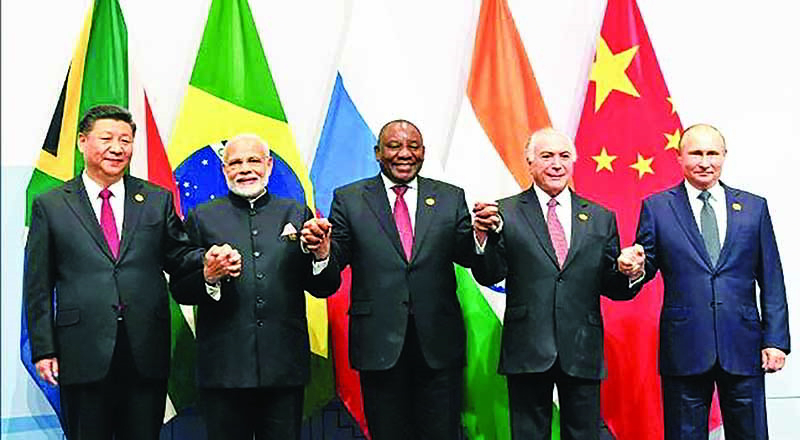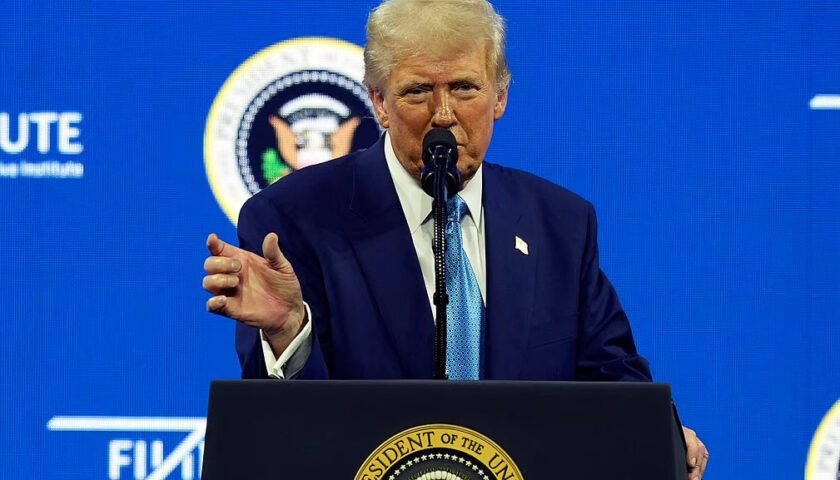At the 10th BRICS Summit, while addressing the Plenary Session, Prime Minister Narendra Modi reaffirmed India’s commitment to multilateralism, international trade, and rules-based world order, in Johannesburg, South Africa –
Prime Minister Narendra Modi addressed the Plenary Session of the 10th BRICS summit in Johannesburg in South Africa as part of his three-leg Africa tour, where he said that India will work with other member states of the economic bloc to prepare for the Fourth Industrial Revolution.
“India will like to work with the BRICS on the issue of the Fourth Industrial Revolution. We need to together prepare best practices and policies in this connection,” he said. He also spoke about the “importance of technology, skill development and how effective multilateral cooperation creates a better world”.
The leaders of the member states- Brazil, Russia, India, China, and South Africa imparted their hand impression on clay in a symbolic demonstration of their connect to the Cradle of Humankind at Maropeng.
The theme for the 10th BRICS Summit is: “BRICS in Africa: Collaboration for Inclusive Growth and Shared Prosperity in the 4th Industrial Revolution”. The theme is reflective of the core priorities of each one of the BRICS members, notably to strive towards the creation of an inclusive society and global partnerships that will bring prosperity to all humankind.The theme is intended to align and ensure strategic continuity with the approved themes for South Africa’s Chairship of both the South African Development Community (SADC) and the Indian Ocean Rim Association (IORA).
Fourth Industrial Revolution is considered the fourth major industrial era since the initial Industrial Revolution of the 18th century and is characterised by a fusion of technologies that is blurring the lines between the physical, digital, and biological spheres.It is marked by emerging technology breakthroughs in a number of fields like-robotics, artificial intelligence, block chain, nanotechnology, quantum computing, biotechnology, the Internet of Things, 3D printing and autonomous vehicles.
During his speech, Modi focused on the challenges of cyber security. He said that everybody knows the importance of working together to fight the challenges thrown up by cyber security.”Industry 4.0 will further increase these challenges and needs,” he said.
“Keeping in mind the importance the changes in technology taking place these days and in the future have for BRICS nations as well as the whole world, I would like to suggest to our ministers discuss this issue in detail,” Modi said.
According to Modi, the world that is being created by new industrial technology and digital interface offers opportunities as well as challenges. “New systems and products will open new roads for economic development,” he said.
Stating that Industry 4.0 will make the world flatter, the Prime Minister said that many deprived classes will be able to make big leaps with the help of technology and development. At the same time, he said it is difficult to say what effect this will have amid growing inequalities, a fast changing society and human values.
“In the Fourth Industrial Revolution, talent will become more important than money,” Modi stated. “The new face of employment will be high skilled but temporary jobs,” he said.
He was of the view that digital platforms, automation and data flows will reduce the importance of geographical distances. “When digital platforms, e-commerce and marketplaces will get linked with such technologies, a new kind of industry and business leaders will surface,” he said.
Stating that the type and opportunities for employment will be an important issue, Modi said that though traditional manufacturing will continue to be an important means of job creation, it will become extremely important for workers to enhance their skills.
According to him, school and university curriculum must be prepared in such a way that the youth can prepare for the future and said that it must be ensured that the changes in technology find place in such curricula. “In India, because of this, the National Skill Development Mission has been started,” the Prime Minister said.
“The intention is to impart to our youth relevant technical and vocational skills,” he said, adding that his government is trying to ensure that quality technical, vocational and higher education is available to all sections of the society.
Prior to the plenary session, Modi attended the leaders’ closed session of the Summit and presented the country statement of India.
Modi is also using this opportunity to further his ‘make in India’ mission and bring together the member nations on a common ground against terrorism and trade wars.





